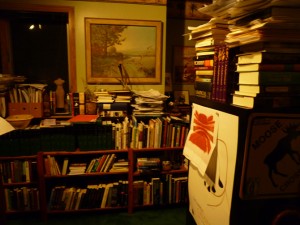Lughnasa New (Back to School) Moon
See you in September
Have a good time but remember
There is danger in the summer moon above
Will I see you in September
Or lose you to a summer love The Happenings (see current pic, right, at EPCOT)
Mmmm. Nothing says aging like current pics of yesterday’s bands.
Hi and Lois had a cartoon this morning in which Dot presents to his class on his summer vacation: “Didn’t do anything much, but that was a lot better than here.”
Made me think. Lots of cartoons, op ed pieces, jokes, old recollections place school over against summer: freedom versus confinement, fun versus work, anarchy vs dictatorship, innocence vs real life. You can add to the dialectics.
Granddaughter Ruth’s entry into pre-school, as I said a couple of weeks ago, opened my eyes to the exceptionally long journey on which she has just begun. At a minimum for a girl like Ruth, teachers as parents, Jewish, well educated grandparents, seemingly bright, her schooling will last 4 years beyond high school. That’s 18+ years of interrupted summer idylls, broken off by the sound of school bells, announcements over the pa system (text messages?) and the scramble to buy school supplies.
Like the putative frog in the slowly boiling pot of water most students don’t realize just how long this commitment is until they near the end of it, for some high school, for others college. I was, for example, in the third (last) quarter of my senior year in college when, over a cup of coffee in the student union, it came to me. I didn’t have to go to college. It was a choice, but so little of one in fact that I only woke from the enchantment as the wicked witch of the real world was about to have me for lunch.
Shopping for school supplies. Loved it. First day of school. Eager to be there. Learning. Loved it and still love it. School and its silly restrictions, its teaching to the mean, its lack of imagination. Hated it. A result for me was a suspicion of the motivation of people in authority. They said they wanted to educate me, really they wanted to control me. I learned many lessons in school, many of them I wish I’d never encountered.
First among them was the sense that true learning was something one had to wrest from the world by main force, not expecting any real help from those who labeled themselves as teachers. This was a bad, a terrible lesson. It has not served me well. I don’t trust mentors, teachers to have my interest ahead of their institutional commitments. Still don’t. I probably could have learned to write much better if I had. Probably would have finished a Ph.D. if I hadn’t graduated from college soured on the whole apparatus of higher education.
This was a wonderful, blessed lesson. It has served me very well. I trust my own work, surround myself with opportunities to learn and apply myself to them with vigor. My thought is mine, shaped only by the minds I encounter in books or in paintings or in movies or of friends. This has lead to an independent, critical and outsider perspective for me, again, a blessing and a curse. The blessing is the necessity of creating my own thoughtworld; the curse is the lack of peer interaction around it.
Since I believe with all my heart that life is one choice after another and that we are responsible for the choices we make, no matter the influences of others or institutions, I cannot blame anyone but me for where I’ve ended up.
The educational establishment, however, still has not gotten over its early industrial template of bells, order and discipline, the true goals of the system, not encouraging inquiry, creation and craft as Paul Goodman talks about: “It is by losing ourselves in inquiry, creation & craft that we become something. Civilization is a continual gift of spirit: inventions, discoveries, insight, art. We are citizens, as Socrates would have said, & we have it available as our own. ” This is the job of education, to spark in us the gift of curiosity, the courage to make things and ideas of our own and to have the fundamentals of good work to polish them.
Our school system, contrary to the longing of the Asian educational establishment, does not in fact, stimulate creativity. The creativity and self-initiative so prized by Asia happens in spite of the cloak of institutional rigor draped over the shoulders of even 4 year old Ruth. It happens because our culture does allow for outliers, for outsiders, for prophets, for critics–our schools do not.
Do school bells, attendance taking, rigid curriculum, regimented class times, supervised play and little, if any, student input get to the goal, helping students grow up as human beings into a culture without losing nature, learning how to be part of a sensible and honorable community? I say no, it does not. Paul Goodman, again: “I might seem to have a number of divergent interests — community planning, psychotherapy, education, politics — but they are all one concern: how to make it possible to grow up as a human being into a culture without losing nature. I simply refuse to acknowledge that a sensible and honorable community does not exist.”

 bookshelves are full and many have books piled on top of them. Each one I want to read. Some I want to use only as reference, but most I want to read cover to cover. The books range in topic from fairy tales and folklore to basic scientific texts on biology and geology, from philosophy to theology, art history to renaissance life, china, japan, india and cambodia to single dictionaries and the multiple volumes of the OED and the Dictionary of Art. Of course there is fiction, too, and poetry, works on historiography and works on the enlightenment. This doesn’t count the 90 books I now have on my kindle, many fiction, but many non-fiction, too.
bookshelves are full and many have books piled on top of them. Each one I want to read. Some I want to use only as reference, but most I want to read cover to cover. The books range in topic from fairy tales and folklore to basic scientific texts on biology and geology, from philosophy to theology, art history to renaissance life, china, japan, india and cambodia to single dictionaries and the multiple volumes of the OED and the Dictionary of Art. Of course there is fiction, too, and poetry, works on historiography and works on the enlightenment. This doesn’t count the 90 books I now have on my kindle, many fiction, but many non-fiction, too. include the histories of Herodotus and substantial commentary. The Mahabharata. Several works on Asia art. A cabinet full of books on the enlightenment and liberalism. Another cabinet full on calendars and holidays. I will never do it. Why? Because I do have interests, obsessions maybe, that take me out into the garden or over to the State Capitol and the Minnesota Institute of Arts, the homes of the Woolly Mammoths and our children. Kate and I will, I imagine, resume at least some of our SPCO attending when she retires and there will be travel, too.
include the histories of Herodotus and substantial commentary. The Mahabharata. Several works on Asia art. A cabinet full of books on the enlightenment and liberalism. Another cabinet full on calendars and holidays. I will never do it. Why? Because I do have interests, obsessions maybe, that take me out into the garden or over to the State Capitol and the Minnesota Institute of Arts, the homes of the Woolly Mammoths and our children. Kate and I will, I imagine, resume at least some of our SPCO attending when she retires and there will be travel, too.